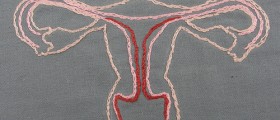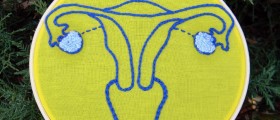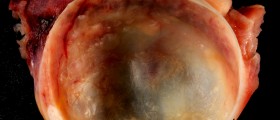
A woman is said to have PCOS, the syndrome, if she presents two out of three of the following symptoms:
1. Failure to ovulate.
2. Symptoms of excessive testosterone such as acne or hair growth.
3. Multiple cysts in the ovaries.
If a woman has ovarian cysts but still ovulates (for instance, if she has cysts in only one ovary), and she does not exhibit signs of excessive testosterone, such as acne or hair growth, then she does not have PCOS. Women who have PCOS are at risk for a variety of serious complications. These include endometriosis or endometrial cancer as the lining of the uterus thickens without being shed during the menstrual period. Women who have PCOS are at greater risk of developing type 2 diabetes, hypothyroidism, high blood pressure, high cholesterol, high triglycerides, heart disease, heart attack, and stroke. They are also risk for a condition known as acanthosis nigrans, a blotchy darkening of the skin. Women with PCOS who get pregnant are more likely to suffer miscarriage. And they tend to have issues with weight control. Women who have cysts in their ovaries without the hormonal imbalances of PCOS are not at risk for all of these ailments.
However, while PCOS can be improved by weight control and diet, ovarian cysts from other causes typically cannot. Women who have ovarian cysts but not PCOS generally need to be careful to avoid steroid medications. In some women who have cysts, steroids result in stimulation of stress hormones, weight gain, and hair loss-some of the same symptoms of PCOS without the underlying hormonal imbalance. In women who have cysts but not PCOS, however, just stopping the medication is enough to reverse the symptoms. Women with PCOS would need much more extensive treatment. Never stop a medication without consulting your doctor first. If there is any good news about polycystic ovaries with or without PCOS, it is that ovarian cysts are almost never a sign of future ovarian cancer. And modern genetic testing can give women a good assessment of their future risk of this dreaded disease.
















_f_280x120.jpg)
Your thoughts on this
Loading...